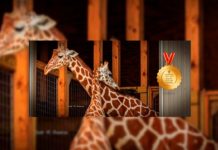BERLIN — When a Berlin newspaper asked its readers to help name two pandas born at the Berlin zoo last week, the contest quickly became weighted with political symbolism and risked the ire of Beijing, which has long treated the animals as surrogate envoys to friendly countries.
The most-suggested names by readers, according to the Tagesspiegel newspaper, were Hong and Kong, an apparent nod to solidarity with the pro-democracy protests that have been roiling Hong Kong, a former British colony that was returned to China in 1997.
The contest comes as Chancellor Angela Merkel of Germany is visiting Beijing, trying to promote the countries’ trade relationship and warning of the harmful effects of the trade war between China and the United States. Ms. Merkel has faced criticism for not doing more to promote human rights on her visit.
The Berlin Zoo, Germany’s oldest and most illustrious, has no part in the naming contest and does not own the pandas. As with most other zoos that have pandas, the animals and their offspring are temporary loans.
The twins were born on Aug. 31 to Meng Meng, 6, and Jiao Qing, 9, the only giant panda couple living in Germany. The parents and newborns belong to the Chengdu Research Base of Giant Panda Breeding, a Chinese research center.
The zoo says it has been paying Beijing $1 million a year since 2017 for the privilege of housing the pandas, under an agreement valid for 15 years.
“The political symbolism is there, and it’s clear that the government and also the leadership of the Berlin Zoo would not allow it,” Prof. Eberhard Sandschneider, who studies Chinese politics at the Free University in Berlin, said of the panda contest on Friday.
“The last thing they would accept in Beijing, when the pandas are eventually brought back,” he added, “are the names Hong and Kong.”
When the two giant pandas were unveiled in 2017, President Xi Jinping of China and Ms. Merkel were on hand for the ceremony. She called them special ambassadors between Germany and China, and he referred to a “new beginning” in relations.
This is not the first time that a public naming contest has gone off the rails.
The debate in Germany is reminiscent of the attempt to name a $287 million British polar research vessel that drew an overwhelming favorite among internet users: Boaty McBoatface. (In the end, one of the boat’s submarines was given that name, while the research vessel itself was christened the R.R.S. Sir David Attenborough.)
The influential German newspaper Bild wrote in a sharply worded article on Thursday: “Bild is choosing to call the panda cubs Hong and Kong because it’s China’s brutal politics that lies behind these panda babies.” It added, “Bild is demanding of the German government that it reacts in a political way to the birth of these small bears.”
Stefan Jacobs, the editor behind the campaign to name the pandas, said in an interview, “The news of panda twins clearly had the potential to be the talk of the town.” He added, “I like asking our Berliner readership these questions — you always get some really funny and really smart answers.”
But the choices that rolled in were fraught with political themes. Among the other suggestions were Pay Pay and Coco & Chanel (because of the cost of raising the pandas); Hinz and Kunz (a nod to German Everyman names); and Tien Tien and Anmen Anmen (in memory of the Tiananmen Square protests).
Pandas were used in 1972 as a high-profile symbol of diplomatic rapprochement between the United States and China, when Ling-Ling and Hsing Hsing arrived during the Nixon era to live at the National Zoo in Washington.
There are currently fewer than 2,000 adult pandas living in their natural habitat. The conception and birth of the animals in captivity are extremely rare and difficult, said Andreas Knieriem, the director of the Berlin Zoo.
“Pandas are not only specialists when it comes to their bamboo diet,” he said in statement. “They are also known for a very specific mating behavior.”
Female pandas are fertile for only 24 to 72 hours once a year, Mr. Knieriem said. The twins’ mother, Meng Meng, did not show reliable signs of gestation until late in the pregnancy, zoo officials said, which is typical for pandas.
The twins appeared destined to be among the Berlin Zoo’s most famous inhabitants. It was also home to Knut, an orphaned polar bear that became a global attraction until he died in 2011. The zoo’s director decided to stuff its body and put it on display in a Berlin museum, a decision that drew protests from fans.
A giant panda named Bao Bao died at the zoo in 2012 at the age of 34. His taxidermied body is on display at the city’s Natural History Museum.
More recently, a couple of gay penguins at the zoo made headlines when they adopted an egg. This week, the world learned that the egg had failed to hatch, with the zoo tweeting, “Surely they will get the chance to become parents again in the future.”
As for the twin pandas, whose gender have not been determined, the newspaper readers are unlikely to get their way. The Berlin Zoo said the names would be chosen with the help of the Chinese research center.
Source : Nytimes












